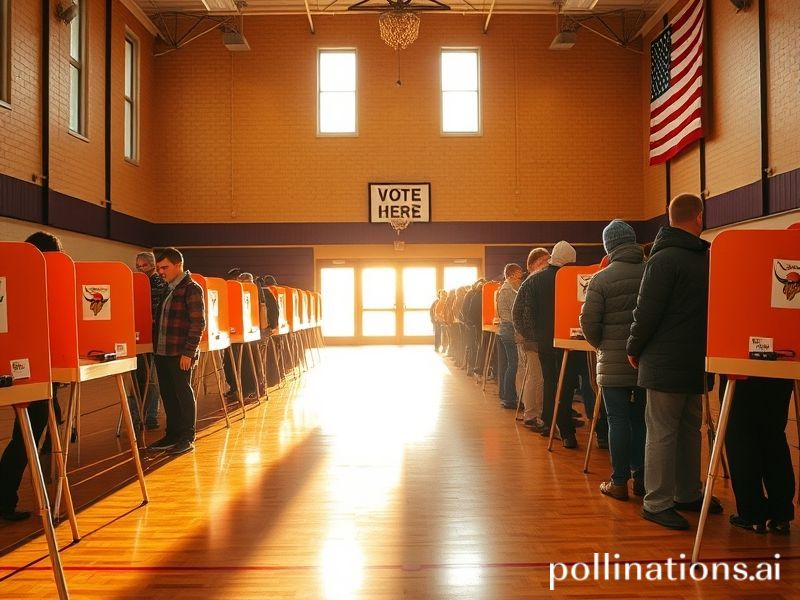Minnesota’s Frozen Polls: Why the World Spies on America’s Nicest Battleground State
**Minnesota’s Modest Electoral Circus: Why a Quiet Northern State Has the Planet Peeking Over Its Snowbank**
From the outside, Minnesota looks like the world’s politest amphitheater: 10,000 lakes, 5.7 million earnest citizens, and a winter so long that even despair puts on a parka and waits in line for hot dish. Yet every four years the international press corps squints at this upper-Midwest snow globe as if it were the Strait of Hormuz with lutefisk. The reason? Minnesota behaves like a mood ring for the American electorate, and when America sneezes the global economy still reaches for a tissue—even if the sneeze is politely stifled into an embroidered handkerchief.
This cycle’s gubernatorial and legislative contests arrived wrapped in the usual bunting of “democracy on the brink,” but the stakes felt almost dainty compared with, say, Jakarta’s street-filling omnibus protests or Tehran’s morality-police bonfires. Still, foreign desks from São Paulo to Stockholm keep a nervous eye on Minnesota because the state has an eerie record of prefiguring national trends: it flirted with third-party populism in 1998 (professional wrestler turned governor, because why not), went Obama-Trump-Biden in the suburban precincts, and still manages to elect the only Democratic Socialists this side of the Atlantic who can pronounce “uff-da” without sounding ironic.
For Europe, Minnesota is a controlled experiment in whether center-left parties can survive after hemorrhaging working-class voters to right-wing carnival barkers. For China, it is a barometer of Midwestern tolerance for trade wars—useful intelligence when deciding how many soybeans to buy from Brazil instead. For Russia, it is simply another patch of prairie to spam with Facebook memes depicting walleye fish wearing MAGA hats, because destabilization is cheaper than vodka and lasts longer.
Election night itself unfolded with the suspense of a Bergman film: long stretches of existential gazing punctuated by sudden bursts of herring-flavored anxiety. Turnout was astronomical, aided by a generous thirty-day early-voting window and a state law permitting citizens to vote from their ice-fishing shacks, provided the ballot is not mistaken for bait. Democrats clung to the governorship; Republicans flipped the state Senate; the electorate essentially ordered the political equivalent of pineapple on pizza—sweet, divisive, and impossible to explain to Italians.
The global takeaway is less about which party won than about the durability of a system that still counts ballots by hand in many counties without anyone being shot, bribed, or hunted by leopards (looking at you, parts of South Asia). International observers from the Organization of American States—accustomed to blood-pressure-spiking melodramas in their own hemisphere—reported being “bored in the most uplifting way,” a phrase that could double as Minnesota’s tourism slogan.
Yet beneath the cordiality lies a warning flare for democracies everywhere. The same demographic fracture lines—urban versus rural, college-educated versus not, grandparents who watched Walter Cronkite versus grandchildren who watch TikTok doctors—map neatly onto plots in France, Brazil, and even India. Minnesota’s polite paralysis merely proves that cold weather suppresses both road rage and coup attempts; it does not inoculate against tribalism.
Meanwhile, the winners now face the unglamorous task of governing a state that manufactures everything from medical devices to artisanal cynicism. They must fund pothole repairs while pretending climate change isn’t turning those potholes into jacuzzis, and they must reassure multinational investors that Minnesota remains more stable than the British pound after a five-day Trussing.
In the end, the world will move on to flashier crises—tsunamis, missile tests, celebrity divorces—but for one frosty evening Minnesota reminded us that democracy’s most exotic feature is not fireworks or fistfights; it is the quiet, almost Scandinavian conviction that counting every vote is more interesting than counting every bullet. How long that conviction survives, of course, is a matter now left to the same species that invented both the stapler and the thermonuclear bomb. Uff-da, indeed.







